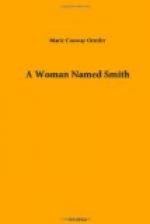* * * * *
“This Day dress’d I in my new Blue Cloathes, the which become me not Ill & riding over to Hope Plant’n did ask for Emily’s Hand. Alas, ’Tis even as my Fears foretold! Shee loves me Not. ’Tis Richard alone hath her Heart.
“I do Fear Shee will sup Sorrow & drink Tears that setts her Affection upon the Unstable. Shee’s too Mild, too Tender, hath not a Firm enough Hand to restrain him. He should een have ta’en Madame Jezebel. Hath a Grand Passion for him. Will not lightly wear the Willow.”
* * * * *
“This Day did Richard my Brother Wed Emily Hope,” he records, after a six-months’ silence. “All say ’tis a most Noble Mating. My Mother in a Gown from London Town, & our Finest Gems, enow to make a Dutchess envious of a Carolina Lady. My Father in high Spiritts.
“I danc’d with the Bridesmaids, but Salut’d not the Bride, the Which noted Madame Jezebel. Was Handsomer than ever I did See her, many thinking her Handsomer than the Bride. Had a great Following, the which the Hussy treat’d with Disdain.
“‘Have you Kiss’d the Bride, Sir?’ says shee, a-mocking of me after her Wont. ‘What a Fine Thing is a Love-Match, Master Freeman!’
“‘Have you Wish’d the Bridegroom Joy?’ says I. The woman anger’d me.
“‘May Heaven send him all the Happiness he Deserves!’ cries shee. ‘Sure, you’ll echo that yourself, Master Freeman!’ ’Tis a jibing Wench. Would to God Richard had Wedded her!”
Then came dry notes of a visit to Kinsfolk in Virginia. Freeman seems to have been away from home for some time. When he returns, it is to chronicle in brief his brother’s downward course. “They have sold Hope Plantation and Most of the Slaves. ’Tis an evil Chance.”
“I shall be Twenty-one next month, though I feel a Thousand. We shall have a Ball, after the Custom of our House. ’Tis to be a Grand Affair. I do think my Parents are somewhat Tender of Conscience to meward. Though my Father Loves me not as he Loves my Brother, yet he begins to Lean upon me more & More Heavily. My poor Mother is a Little Envious of these Dry Virtues of mine, seeing her Darling is like to come to Shipwreck for Lack of them. Yet had he Fortune & Beauty & Emily!”
The next entry records the loss of the Hynds jewels. “’Tis a great Mystery!” One is sorely puzzled here. There is no getting at what Freeman really thinks. Coldly, tritely, he sets down the bald, bare facts of the tragedies that wrecked the Hyndses.
With a strange lack of emotion he chronicles Richard’s death, and adds: “At the Pleasure of God his Birth fell upon a Wednesday, at Sun-rising, the which was by some Accounted Favourable. His Death came upon a Friday, at Noone, it Raining heavily.”
Then comes his father’s sudden death; and this curious item:
“Despite his Anguish & Affliction of Spiritt upon that Date, he did tell me Part, after the Custom of our House, the morning of my Twenty-first Birthday. Alas, when he was Stricken, upon the News of Richard’s Demise, he had no Chance to tell me All, nor was there among his Papers the Keye nor any Clue to It. When J. call’d us, he was Beyond Speech & shee Hystericall with Affright. Thus the Whole Secret perishes, since Without the Keye & his Instructions ’twould be Impossible to Proceed.”




